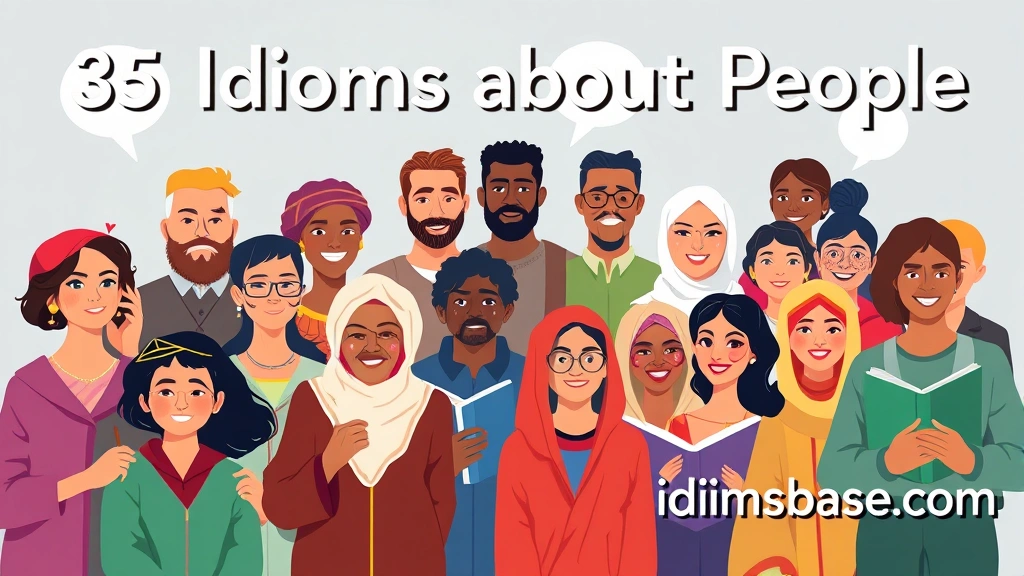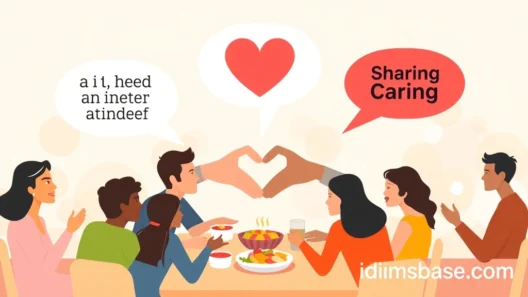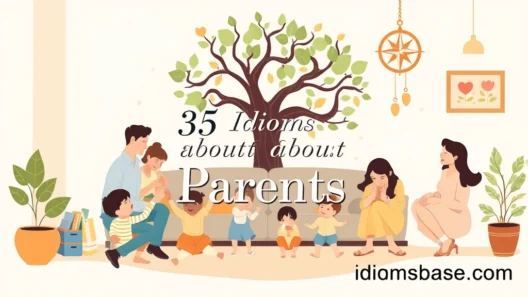Have you ever found yourself scratching your head, trying to figure out what someone really meant when they said, "He's a chip off the old block" or "She's a loose cannon"? English is wonderfully rich with expressions, especially when it comes to describing people. Idioms are like secret codes that add color, humor, and depth to our conversations. They paint vivid pictures and often convey a whole lot more than individual words ever could.
Understanding these common idioms about people isn’t just about sounding more fluent; it’s about truly grasping the nuances of communication, connecting with others on a deeper level, and even enjoying a good laugh! So, buckle up, because we're about to explore 35 fantastic idioms that describe personalities, behaviors, and relationships. You'll be using them like a pro in no time!
35 Awesome Idioms About People
Let's dive into this treasure trove of linguistic gems! You'll discover how these phrases can spice up your conversations and help you understand others better.
-
A chip off the old block: Someone who resembles their parent in character or appearance.
- Example: "He's so good at problem-solving, a real chip off the old block, just like his dad."
-
A loose cannon: An unpredictable person who might cause damage.
- Example: "We need to be careful with him; he's a bit of a loose cannon when he gets angry."
-
A big cheese: An important or influential person.
- Example: "The CEO is a big cheese around here; everyone listens to him."
-
A cold fish: A person who shows little emotion or seems unfriendly.
- Example: "It's hard to get to know him; he's a bit of a cold fish."
-
A busybody: Someone who meddles in other people's affairs.
- Example: "My neighbor is such a busybody, always asking about everyone's business."
-
A dark horse: A person who keeps their talents or plans secret, often surprisingly successful.
- Example: "No one expected her to win the competition, but she turned out to be a dark horse."
-
A couch potato: A lazy person who spends a lot of time watching TV.
- Example: "After a long week, all I want to be is a couch potato on the weekend."
-
A wet blanket: A person who spoils other people's fun.
- Example: "Don't invite him to the party; he's such a wet blanket."
-
A fair-weather friend: Someone who is only your friend when things are easy or convenient.
- Example: "When I lost my job, I realized who my true friends were, and who was just a fair-weather friend."
-
A rolling stone: A person who does not stay in one place or job for long.
- Example: "He's been to so many countries; he's a real rolling stone."
-
A chatterbox: A person who talks a lot.
- Example: "My little sister is a total chatterbox; she never stops talking!"
-
A know-it-all: Someone who acts as if they know everything.
- Example: "It's hard to have a conversation with him because he's such a know-it-all."
-
A straight arrow: An honest, moral, and conventional person.
- Example: "You can trust her completely; she's a straight arrow."
-
A sharp cookie/tack: An intelligent and astute person.
- Example: "Don't try to trick her; she's a sharp cookie."

-
A tough nut to crack: A person who is difficult to understand or deal with.
- Example: "The new manager is a tough nut to crack; I can't figure out what he wants."
-
A bad egg: A person who is dishonest or unreliable.
- Example: "He caused a lot of trouble; he's a bad egg."
-
A busy bee: A very active and hardworking person.
- Example: "She's always getting things done; she's a real busy bee."
-
A copycat: Someone who imitates or copies others.
- Example: "Stop being a copycat and try to be original!"
-
A square peg in a round hole: A person who is in a situation that does not suit them.
- Example: "He's a creative artist stuck in an accounting job – a square peg in a round hole."
-
A social butterfly: A person who is outgoing and enjoys socializing.
- Example: "She knows everyone at the party; she's a real social butterfly."
-
A man/woman of his/her word: Someone who always keeps their promises.
- Example: "If he said he'd do it, he will; he's a man of his word."
-
A people person: Someone who is good at interacting with others.
- Example: "With her friendly demeanor, she's definitely a people person."
-
An early bird: Someone who likes to wake up or arrive early.
- Example: "I'm an early bird, so I always get to work before anyone else."

-
A night owl: Someone who likes to stay up late.
- Example: "My roommate is a night owl; he's always awake when I'm going to bed."
-
A lone wolf: A person who prefers to act alone.
- Example: "He doesn't like working in teams; he's a bit of a lone wolf."
-
A big mouth: Someone who talks too much, especially about secrets.
- Example: "Don't tell him your secret; he has a big mouth."
-
A good egg: A person who is kind and dependable.
- Example: "She's always willing to help; she's a really good egg."
-
A live wire: An energetic and exciting person.
- Example: "The new intern is a real live wire, full of ideas and enthusiasm."
-
A mover and shaker: An influential person who gets things done.
- Example: "She's a mover and shaker in the tech industry, always starting new ventures."
-
A pain in the neck: An annoying or troublesome person.
- Example: "My little brother can be a real pain in the neck sometimes."
-
A pillar of the community: A respected and important member of a community.
- Example: "He's been volunteering for decades; he's a true pillar of the community."
-
A salt of the earth: A very honest, kind, and trustworthy person.
- Example: "My grandparents are the salt of the earth; they're so genuine and kind."

-
A stick in the mud: A person who is dull and unadventurous.
- Example: "Come on, don't be a stick in the mud, let's go dancing!"
-
A top banana: The most important person in a group or organization.
- Example: "He’s the top banana in the marketing department."
-
A wise guy: Someone who is presumptuous and arrogant.
- Example: "Don't be a wise guy; just answer the question directly."
Key Takeaways
- Idioms add flavor: They make your English sound more natural and expressive.
- Context is key: Understanding the situation helps you grasp the meaning of an idiom.
- Practice makes perfect: The more you hear and use them, the easier they become.
- They describe personality: Many idioms paint vivid pictures of someone's character.
- Fun to learn: Expanding your idiom vocabulary is an enjoyable way to boost your language skills.
Frequently Asked Questions (FAQ)
What exactly is an idiom?
An idiom is a phrase or expression where the meaning isn't obvious from the individual words. For example, "kick the bucket" doesn't literally mean to kick a bucket; it means to die. Idioms are often cultural and can be tricky for language learners, but they're essential for sounding like a native speaker!
Why are idioms about people so common?
People are fascinating, aren't they? We love to describe personalities, quirks, and behaviors, and idioms provide a colorful, concise, and often humorous way to do just that. They allow us to convey complex ideas about character quickly and vividly.
How can I remember so many idioms?
Great question! Here are a few tips for you:
- Contextual learning: Try to learn idioms in sentences or stories.
- Visualise: Many idioms create a mental image (e.g., "couch potato").
- Use them: Actively try to incorporate them into your conversations or writing.
- Flashcards: Create flashcards with the idiom on one side and its meaning/example on the other.
- Group similar ones: For instance, group all "animal" idioms or "food" idioms.
Are these idioms used in formal or informal settings?
Most of the idioms listed here are generally used in informal or semi-formal settings. While you might hear them in casual conversations, many would sound out of place in a very formal business presentation or academic paper. However, understanding them is crucial for comprehension in almost any context.
Can I create my own idioms?
While you can certainly play with language and come up with creative new phrases, for a phrase to become a true "idiom," it needs to be widely adopted and understood by a large group of native speakers over time. It's a spontaneous, organic process, not something you can force! Focus on mastering existing ones first.
Where can I find more idioms?
There are tons of resources! You can check out idiom dictionaries, online idiom websites, English language learning apps, and even TV shows and movies (pay attention to natural dialogue!). Reading extensively in English is also a fantastic way to encounter them naturally.
Learning idioms is a journey, not a sprint. Keep practicing, keep listening, and don't be afraid to try them out. You'll be describing people with colorful, idiomatic flair in no time. Which of these idioms is your favorite? Share it with a friend and start a fun conversation today!






